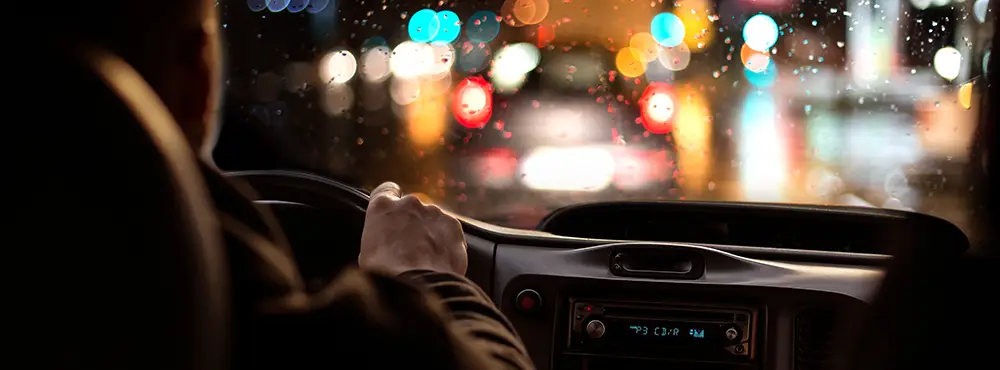Medically reviewed by Khuram Sarwar, Dispensing Optician at Feel Good Contacts
Driving at night can be quite intimidating, no matter how much of an experienced driver you are. It requires extra vigilance than daytime driving and there are many more precautions to take when driving in the dark.
If you find yourself struggling to see road signs clearly, or even squinting at the dashboard, then you may require glasses for driving at night. For a full breakdown of night-time driving glasses, read below.
Do I need night-time driving glasses?
Driving at night in the UK may be particularly challenging for most people, especially during the colder seasons when darkness can come as early as 3pm. However, there are several ways to spot whether you need glasses for night driving:
- Your vision is blurry and impaired when driving at night
- Glare and reflections from streetlights and headlights affect your vision
- Difficulty seeing the dashboard
- Eye strain or fatigue when driving at night
As always, it’s a good idea to check with your optician if you are experiencing any of these symptoms. Driving without meeting the standards of vision can land you a huge fine from DVLA.
Why do I need night glasses for driving?
If you do not require glasses to drive during the day, then you may be wondering why you would have to wear glasses when driving at night-time. This is simple – night blindness. Medically known as nyctalopia, this is when you experience poor vision at night or in dimly lit environments. This is a result of the eye being unable to adapt to low light conditions.
Night blindness is often a symptom of an existing eye condition such as near-sightedness (myopia), cataracts, and glaucoma.
Usually, the pupil in the eye adapts to low lighting by dilating so that the retina can receive more light. Rod cells within your eye also help you to see in the dark, however, rod cells can malfunction if the eye has an injury or disease. This will then cause night blindness.
What kind of glasses are best for night driving?
If headlights and high beams are affecting your vision, then the best option is an anti-reflective (or anti-glare) coating for your glasses. This will remove the harshness from the lights of oncoming vehicles, your vehicle’s lights and streetlights – thus improving visibility. Feel Good Contacts offers an anti-reflective coating for your glasses as part of our standard plus package.
Another way to correct night blindness whilst driving is to correct the eye condition that is causing it:
Blurred vision
If streetlights and headlamps increase the number of glares and halos you see, then you may be suffering from astigmatism. In this case, your optician will update your prescription and dispense corrective glasses or contact lenses according to your needs.
Blurry road signs
If you are struggling to see road signs and far distances when driving at night, this may be due to myopia. In this case, your optician will update your prescription to reflect this. Single-vision lenses are one of the best options to correct myopia. This can help correct night-time blindness.
Difficulty seeing your dashboard
If you have difficulty reading your dashboard whilst driving, this could be a sign of presbyopia. This is a refractive error that occurs with age. It is when you gradually lose the ability to see things clearly up close. Night-time blindness may occur as a result of presbyopia. In this case, your optician will update your prescription – multifocal glasses or contact lenses are the best options for presbyopia.
It’s important to note that there are many tinted glasses and clip on night driving glasses on the market which claim to be designed particularly for night driving. Tinted glasses are not recommended for night-time driving as they block additional light, which is dangerous whilst driving in an already low-lit environment.
Additionally, polarised, mirrored, gradient tints are not recommended for night-time driving and can cause more harm than good.
You should always seek advice from your optician and only purchase optician-approved glasses.
Disclaimer: The advice in this article is for informational purposes only and does not replace medical care or an in-person check-up. Please check with an eyecare professional before purchasing any products or remedies. For information on our article review process, please refer to our Editorial Policy.

 Offers
Offers Account
Account
 Favorite
Favorite
 Basket
Basket

 OFFERS
OFFERS
















